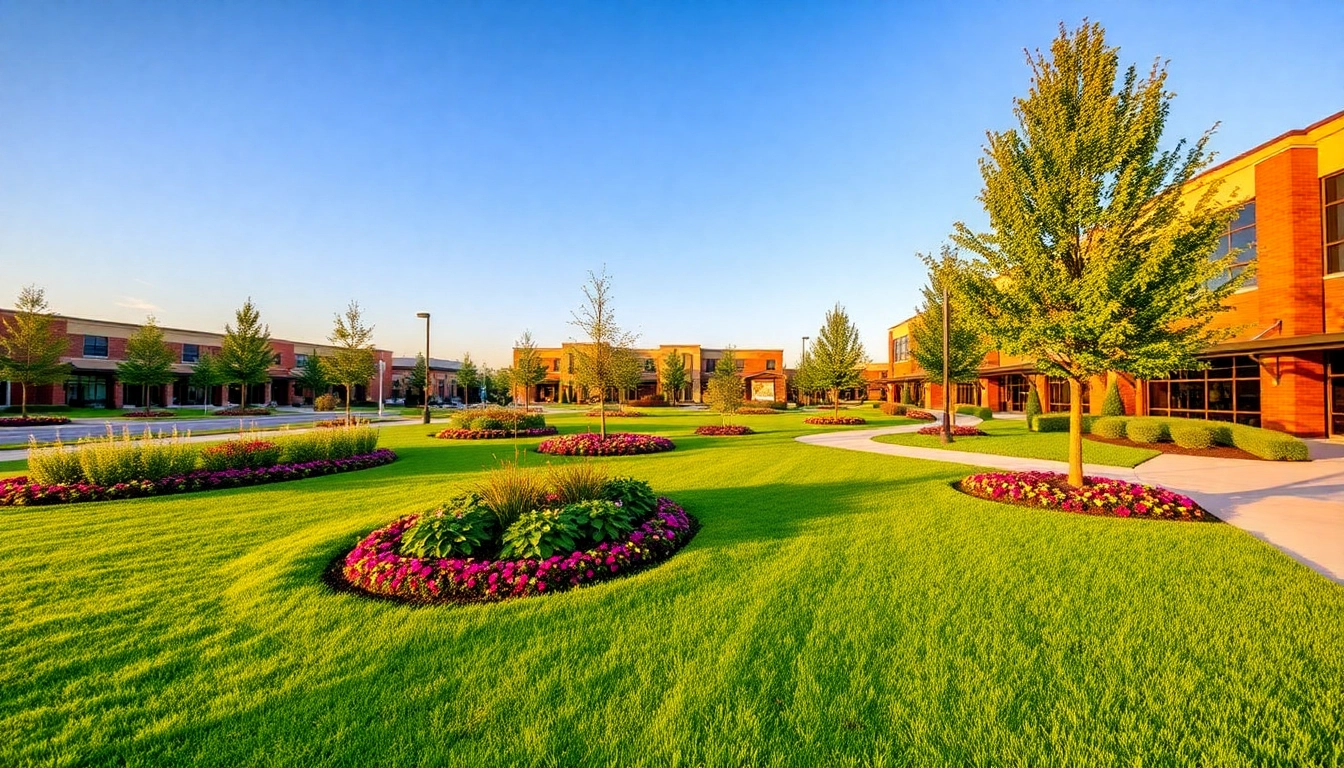Understanding Commercial Landscaping
What is Commercial Landscaping?
Commercial landscaping refers to the design, installation, and maintenance of outdoor spaces around commercial properties. These spaces can include office buildings, retail establishments, hotels, and public areas. Unlike residential landscaping, which generally focuses on individual homes, commercial landscaping projects aim to enhance the visual appeal and functionality of larger landscapes that have a significant impact on businesses and communities.
Projects can vary greatly in scope, from installing small gardens and pathways to large-scale designs complete with lawns, trees, shrubs, walkways, and decorative elements. Many businesses invest in commercial landscaping as a strategy to boost their curb appeal, improve the working environment, and increase property value. In this competitive marketplace, hiring qualified commercial landscaping contractors can make all the difference.
Types of Services Offered by Commercial Landscaping Contractors
Commercial landscaping contractors offer a wide range of services tailored to the needs of businesses and organizations. Some of these services include:
- Landscape Design: Creating customized landscape designs that align with the company’s brand and aesthetic preferences.
- Plant Installation: Selecting and installing appropriate plants, trees, and shrubs that thrive in the local climate.
- Maintenance Services: Regular upkeep including mowing, pruning, fertilization, and irrigation management.
- Irrigation Systems: Designing and installing efficient irrigation systems to ensure proper watering of landscapes.
- Hardscaping: Adding structures such as walkways, patios, retaining walls, and decorative features made from stone, concrete, or pavers.
- Seasonal Clean-ups: Preparing landscapes for winter dormancy or spring revival, including leaf removal and seasonal planting.
- Tree and Shrub Care: Specialized care, including pruning, tree health assessments, and disease management.
Benefits of Professional Commercial Landscaping
Investing in professional commercial landscaping offers several advantages, including:
- Enhanced Curb Appeal: Well-designed landscapes attract customers, clients, and employees, creating a welcoming environment.
- Improved Property Value: Attractive outdoor spaces can significantly increase the market value of a property.
- Increased Productivity: A well-maintained landscape can improve employee morale and productivity by creating a pleasant work environment.
- Environmental Benefits: Professional landscaping can improve air quality, reduce erosion, and promote biodiversity.
- Brand Image: A well-maintained landscape reflects positively on the business, conveying professionalism and attention to detail.
- Cost-Effective Maintenance: Regular maintenance by professionals can save businesses money in the long run by preventing more significant issues.
Key Factors to Consider When Hiring Commercial Landscaping Contractors
Evaluating Experience and Portfolio
When engaging a commercial landscaping contractor, evaluating their experience and portfolio is essential. Experienced contractors possess a wealth of knowledge regarding landscape design and maintenance best practices and can offer insights that less experienced contractors may lack. Reviewing their portfolio allows you to assess their style, creativity, and level of sophistication in past projects.
Ask for examples of similar projects they have completed, particularly those that align with your business’s objectives and aesthetic preferences. You may even seek references or testimonials from previous clients to gain a better understanding of their reliability, professionalism, and problem-solving capabilities.
Importance of Licensing and Insurance
Always verify that potential contractors possess the necessary licenses and insurance coverage. Working with licensed professionals ensures compliance with local regulations and standards. Insurance protects you from liability in case of accidents or damages that may occur during the project. It is advisable to request proof of insurance and verify coverages before signing any contracts.
Reading Reviews and Testimonials
Consumer reviews and testimonials can offer valuable insights into a contractor’s reputation and the quality of their work. Online platforms like Google, Yelp, and landscaping-specific forums allow you to gather opinions and experiences from other clients. Look for contractors with consistently positive feedback and address any concerns or complaints that previous customers have raised. Engaging with contractors who are responsive to feedback can indicate their level of commitment to client satisfaction.
Cost Considerations for Commercial Landscaping
Average Costs of Commercial Landscaping Services
The cost of commercial landscaping services can vary significantly based on several factors, including the project’s scope, the materials used, and the geographical location. On average, commercial landscaping costs range from $2 to $10 per square foot. For example, landscape design and installation may require a higher upfront investment, while routine maintenance services might follow different pricing structures based on frequency and service types.
Factors Influencing Pricing
When estimating costs, it’s crucial to consider various factors that can influence pricing:
- Project Size: Larger projects typically incur higher overall costs but may have lower per-square-foot rates.
- Complexity: Unique landscape designs, specialized plant installations, and intricate hardscaping can increase expenses.
- Materials: The selection of plants, soil, mulch, and hardscaping materials can significantly affect total costs.
- Labor Costs: Region, industry standards, and contractor experience can lead to variations in labor costs across different areas.
- Equipment Usage: The need for specialized equipment may also add to the cost of commercial landscaping services.
Budgeting for Long-Term Maintenance
Long-term maintenance plays a crucial role in preserving the health and aesthetic appeal of landscaped properties. Businesses should plan for ongoing maintenance costs, accounting for regular services such as mowing, fertilization, seasonal plantings, and irrigation upkeep. Establishing a maintenance budget will help ensure that landscapes remain vibrant and welcoming while preventing costly repairs or replacements down the line.
Finding the Right Commercial Landscaping Contractors
Where to Search for Contractors
Finding capable commercial landscaping contractors can involve several strategies:
- Online Research: Search engines, social media, and landscaping directories can provide a list of contractors in your area.
- Referrals: Asking industry colleagues and local business owners for recommendations can yield trustworthy options.
- Trade Shows and Local Events: Networking at landscaping and gardening events can introduce you to professionals in your area.
How to Shortlist Potential Candidates
Create a list of potential contractors, then begin the process of narrowing it down. Establish criteria based on the evaluation factors discussed earlier, such as experience, portfolio quality, customer reviews, and insurance and licensing. A strong shortlist of candidates will provide a solid foundation for the next steps.
Conducting Interviews and Assessments
Once you have a shortlist, conducting interviews is an essential step in the hiring process. Prepare a list of questions that address your project’s specifics, including:
- What is your experience with projects similar to mine?
- Can you provide references from previous clients?
- What is your approach to project management and communication?
- What is your estimated timeline for completion?
- How do you handle unexpected challenges or changes during a project?
The responses to these questions will allow you to assess the contractor’s expertise, responsiveness, and overall suitability for your needs.
Project Management and Communication with Contractors
Setting Clear Expectations and Goals
Clear communication is vital for successful collaboration with a landscaping contractor. Begin by establishing specific goals for the project, detailing your vision and objectives. Providing the contractor with a clear understanding of what you expect will lead to better alignment on deliverables, timelines, and results.
Monitoring Progress and Quality of Work
Once a project begins, regular monitoring of progress and quality is essential. Schedule periodic check-ins to assess development and provide feedback. Consider utilizing project management tools to keep track of milestones and deadlines, ensuring transparency and accountability throughout the project.
Importance of Feedback and Adjustments
Throughout the project, maintaining open lines of communication will increase the likelihood of successful outcomes. Provide constructive feedback, allowing contractors to make adjustments where necessary. A willingness to adapt and collaborate on changes will result in a landscape that more accurately reflects your vision while addressing any emerging needs.






